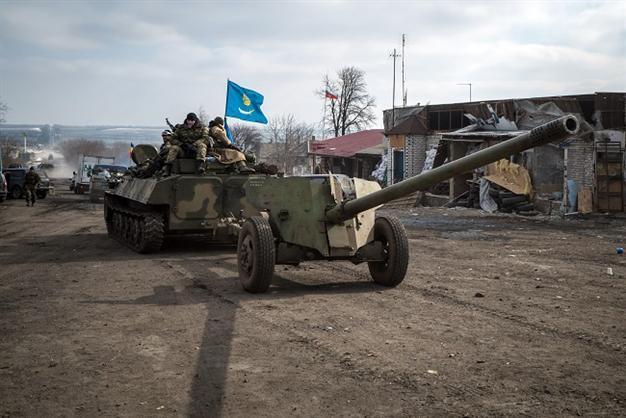Ukraine lost ’179 troops’ in battle for Debaltseve
KYIV - Agence France-Presse

Pro-Russian rebels leave the eastern Ukrainian city of Debaltseve after an operation on February 20, 2015. AFP PHOTO/ ANDREY BORODULIN
Ukraine lost 179 troops in the one-month battle with pro-Russian rebels that ended in defeat over the key eastern town of Debaltseve, Yuri Biryukov, an advisor to Ukraine’s president said on his Facebook page Feb. 21.If that figure is confirmed, it would represent one of the bloodiest losses suffered by the Ukrainian side in the 10-month conflict.
Kyiv has officially given a toll of 13 soldiers killed on Feb. 17 and Feb. 18, when Debaltseve was overrun by the pro-Russian separatists in defiance of a UN-backed truce.
Meanwhile, pro-Russian rebels said they will swap prisoners with the Ukrainian side Feb. 21 as part of a battered truce that the West hopes will cool a deadly conflict that has poisoned relations with Moscow.
"Today (Saturday) there will be an exchange between us and the Ukrainian side," said the rebels’ official for human rights, Daria Morozova.
Around 40 prisoners on each side -- some of them wounded -- are to be handed over, with the exchange to take place deep in rebel territory, in the city of Lugansk, Morozova said.
Journalists were put in a convoy carrying the rebels’ prisoners from the separatist stronghold of Donetsk to Lugansk. The soldiers had beards and looked tired. One had his arm bandaged.
There was no immediate confirmation of the swap from the Ukrainian side, though smaller exchanges have taken place in recent weeks with little fanfare.
In the most egregious breach, the pro-Russian separatists overran a strategic transport hub, Debaltseve, midway between Donetsk and Lugansk.
That offensive forced 2,500 Ukrainian soldiers to flee under fire, with at least 13 of them killed. The insurgents seized at least 110 troops as prisoners, adding to the unknown number of detainees held by each side.
Germany and France, which brokered the truce agreed by Ukraine, the rebels and Russia, are standing by it despite the many violations.
"We don’t have any illusions" about the difficulty involved, German Chancellor Angela Merkel said after meeting French President Francois Hollande in Paris on Feb. 20.
But she said she was "even more convinced" a truce leading to a negotiated solution was the only way to end the conflict, which the United Nations estimates has killed 5,700 people since it began in April last year.
Truce does not hold
Under the truce, both sides were to withdraw their heavy weapons from the frontline by March 3, carry out a prisoner exchange, conduct negotiations on greater autonomy in rebel-held areas, and eventually restore Ukraine’s control over all of its border with Russia.
None of those steps has so far been taken.
Kyiv and the rebels continue to trade accusations of shelling, mortar rounds and rocket strikes targeting their positions.
Ukrainian defence officials allege that Russia has deployed 20 tanks towards the port city of Mariupol and that their forces have shot down several enemy reconnaissance drones.
The rebels have claimed to have pulled back weapons in some areas, but there was no confirmation from the Organization for Security and Cooperation in Europe, which is monitoring the truce.
The rebels have so far barred the OSCE observers from entering Debaltseve to assess the situation, but promised they would finally be allowed in on Sunday.
Russia’s repeated denials of militarily backing the separatists have been dismissed by the West, which says it has satellite imagery and other confirmation of troop and materiel movements.
"Russia’s continued support of ongoing separatist attacks in violation of the ceasefire in eastern Ukraine is undermining international diplomacy and multilateral institutions -- the foundations of our modern global order," US State Department spokeswoman Jen Psaki said in Washington.
"By not abiding by the agreement they signed, by continuing to support and intervene illegally in Ukraine... they’re violating international norms and they’re violating international law," she said, voicing some of Washington’s harshest criticism to date of Moscow.
Moscow is under several rounds of US and EU sanctions over the crisis, but while they have pushed Russia’s towards recession they have thus far failed to change President Vladimir Putin’s stance.
EU president Donald Tusk said Feb. 20 that more "costs" could be exacted over the frayed truce.
In one sign of the effects on Russia’s economy, rating agency Moody’s cut its debt note by one notch into "junk" territory, just a month after its last downgrade.
It said the Ukraine crisis and the fall in oil prices and the ruble will further undermine Russia’s performance.
Russia "is expected to experience a deep recession in 2015 and a continued contraction in 2016," Moody’s said in a statement.
Ukraine’s finances, too, are in a parlous state, with its currency, the hryvnia, falling in value daily. Doubts persist over whether a four-year, $40 billion aid package backed by the International Monetary Fund will be enough to bring it back from the brink of collapse.
















